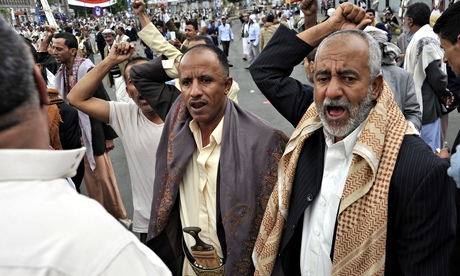
As recently as last June, President Obama was recommending Yemen as a model of what can be achieved in the Middle East without troops on the ground. Following the mass revolt that ended President Ali Abdullah Saleh’s 33 years in power, Yemen’s new government was a “committed partner”, said Obama, and the US also had enough counterterrorism capabilities there “to go after folks that might try to hit our embassy or might be trying to export terrorism into Europe or the United States”.
The Yemen model, Obama continued, was “going to be part of the solution in dealing with both Syria and Iraq”.
Last month, though, the Yemen model fell apart when rebels calling themselves The Supporters of God swept into the capital, Sana’a, seizing key positions and triggering a dissolution of the government.
The Supporters of God – popularly known as Houthis after their founder, the late Hussein Badreddin al-Houthi – belong to the Zaidi branch of Shia Islam and hail from the far north of Yemen. They have long been marginalised, socially and economically, and in the 1990s they also began to resent the arrival of Wahhabi/Salafi missionaries trying to convert them.In the words of veteran Yemen-watcher Shelagh Weir:
“During the 1990s the growth of socially divisive Salafism within the heartlands of Zaidi Islam was encouraged and funded by officials and business interests in Saudi Arabia and in Yemen – including President Ali Abdullah Saleh. Salafis increasingly mocked or questioned the beliefs and rituals of the Zaidi majority, threatening them in mosques and accusing them of wanting the return of the imam [ie the end of the republican system] – though this was publicly denied by the Zaidi clerics.”
Between 2004 and 2010 the Yemeni government and the Houthi rebels fought a series of inconclusive wars. In the last of these, dubbed Operation Scorched Earth by the Yemeni government, Saudi warplanes carried out air strikes in support of the Saleh regime.
Until last summer, the Houthi problem still seemed remote from the capital but in July the rebels captured Amran, little more than 30 miles northwest of Sana’a. This was a significant victory because it struck at the power base of the dominant Hashid tribal confederation and the influential Islamist-traditionalist Islah party.
From Amran it was only a short step to the capital, which the Houthis entered without much resistance, celebrating their arrival with an enormous fireworks display. Since then, they have been patrolling the streets, operating checkpoints, controlling access to some government buildings and establishing themselves as the country’s power-brokers.
For many Yemenis, accustomed to living in the midst of turmoil, this was not necessarily an unwelcome development, though the Houthis have plenty of enemies and we may yet see a fight-back.
In the meantime, President Abd-Rabbu Mansour Hadi is struggling to find a new prime minister who will be acceptable to all sides, and there are several other obvious casualties.
One is the political “transition plan” developed by the Gulf monarchies and approved by the UN, which can probably be considered dead. It was aflawed plan anyway, designed to preserve as much of the status quo as possible while providing for Saleh’s resignation. The Gulf states are fuming at the latest turn of events and have called for the “restoration” of government authority. In reality, there is little to restore, because the Yemeni government has never held much sway outside the major cities.
The Houthis’ Shia connection also fuels Gulf paranoia and sectarian rhetoric directed against Iran, though the extent of Iranian support for the Houthis is far from clear – not least because of theological differences.
Other initial casualties of the Houthis’ rise appear to be the Islah party and General Ali Muhsen al-Ahmar. Once regarded as the second most powerful man in Yemen, Ahmar commanded the First Armoured Division but is now reported to have fled the country and the Houthis plan to turn his headquarters into a public park. Few will be sorry to see him gone.
The Sunni Islah party, often viewed as Yemen’s equivalent of the Muslim Brotherhood, has been a primary target for the Houthis. Its members range from Tawakkul Karman, the Nobel peace prize winner, at one end of the spectrum, to the red-bearded Abdulmajid al-Zindani, listed by the US as a “specially designated global terrorist” at the other.
On arriving in Sana’a, the Houthis invaded Karman’s home and seized Iman university, a controversial religious institution founded by Zindani which claims to have developed an Islamic herbal cure for HIV/Aids.
It’s still unclear how this will affect the US. The Houthis have often indulged in anti-American rhetoric but they are also sworn enemies of al-Qaida. Al-Qaida, meanwhile, has been calling on its supporters to fight the Houthis and has already launched several apparent attacks – the latest one reportedly killing at least 42 people.
In southern Yemen, where the Herak movement is seeking independence from the north, many are also in a quandary. Susanne Dahlgren writes:
“Southerners received the news of the Houthi takeover of Sana’a with mixed feelings. Some are optimistic that the sudden change opens up the possibility of breaking the overall political deadlock that men such as Salih created. Others see the country dragged more deeply into the great game between the Saudis and the Iranians for regional hegemony, a message that satellite channels from the Gulf repeat evening after evening. For still others, the Houthis are just hicks with no manners.”
In a country where conspiracies and rumours of conspiracies abound, many are wondering how the Houthis could have come so far without inside help.
Charles Schmitz of the American Institute of Yemeni Studies, who haswritten at length about the rise of the Houthis, hints at possible collusion with President Hadi: “Hadi appears to be allowing the Houthi advances to hurt the Islah party as part of a major reshuffling of the political landscape in Yemen.”
Others suspect the hand of ex-president Saleh who was allowed to stay in Yemen after his resignation, protected from prosecution, and in a position to cause further trouble. Last week, one Yemeni website published what it said was a poster on sale in Sana’a showing the Houthi leader side by side with Saleh’s son (formerly regarded as heir to the presidency) with a caption saying: “We have committed ourselves to the service of this people.”


No comments:
Post a Comment